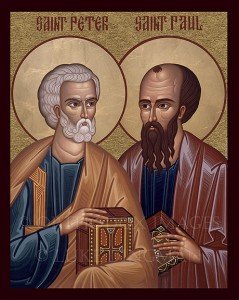In a chronologically ordered New Testament, the next writing that must be considered after the Gospel of John is Paul’s Letter to the Ephesians. Like the Letter to the Colossians, Ephesians is one of the disputed letters of Paul – there is some thought among scholars that Paul did not actually write this letter but that it was penned by one of his disciples.
 Early Christian tradition, beginning with Irenaeus and Clement of Alexandria in the late second century, unhesitatingly ascribed, however, this epistle to St. Paul. Since the early nineteenth century critical scholarship has considered the word-usage, style, comparison with Colossians, the epistle’s concept of the church, as well as the doctrine put forward by the writer, to be the basis for strong doubts about its Pauline authorship. This divergence between the two capital sources of opinion on the origin of Ephesians makes it impossible to give a categorical pronouncement for or against authorship by Paul. He was probably not the author of Ephesians in the same sense as of other epistles such as Romans, Galatians, 1 and 2 Corinthians. Whatever the epistle’s literary origin, however, the author considered its teachings to be in the Pauline tradition and for purposes of interpreting the text itself, it is practical to adopt the clear implication therein that Paul is its author. If Ephesians is analyzed within the context of Pauline writings, the question of its relationship to the thought of Colossians and other letters of Paul may be fruitfully studied. Though it has the typical form of a Pauline letter and echoes some very important themes from the seven genuine letters of Paul, it also differs in a number of ways.
Early Christian tradition, beginning with Irenaeus and Clement of Alexandria in the late second century, unhesitatingly ascribed, however, this epistle to St. Paul. Since the early nineteenth century critical scholarship has considered the word-usage, style, comparison with Colossians, the epistle’s concept of the church, as well as the doctrine put forward by the writer, to be the basis for strong doubts about its Pauline authorship. This divergence between the two capital sources of opinion on the origin of Ephesians makes it impossible to give a categorical pronouncement for or against authorship by Paul. He was probably not the author of Ephesians in the same sense as of other epistles such as Romans, Galatians, 1 and 2 Corinthians. Whatever the epistle’s literary origin, however, the author considered its teachings to be in the Pauline tradition and for purposes of interpreting the text itself, it is practical to adopt the clear implication therein that Paul is its author. If Ephesians is analyzed within the context of Pauline writings, the question of its relationship to the thought of Colossians and other letters of Paul may be fruitfully studied. Though it has the typical form of a Pauline letter and echoes some very important themes from the seven genuine letters of Paul, it also differs in a number of ways.
The differences include, as said, style and subject matter. In Ephesians, as in Colossians, many of the sentences are very long, unlike the commonly short and energized sentences of Paul’s genuine letters. Differences in subject matter include the emphasis of Ephesians on the Church and its extended household codes, something which I will refer to later.
It seems certain that this epistle was not specifically addressed to the Christians of Ephesus. Paul had labored there for well over two years and would hardly have written so impersonally to a community with which he was intimately acquainted. If Ephesians is the letter referred to in Colossians (4:16), it may well have been addressed to a number of Christian communities, thereby accounting for the more impersonal tone.
